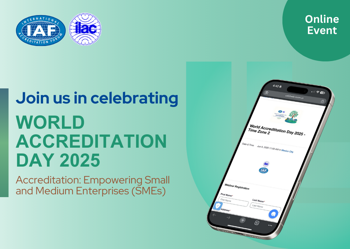
PJLA Joins the Global Celebration
World Accreditation Day (WAD), an annual global initiative led by ILAC and IAF, returns on June 9, 2025, to spotlight the essential role of accreditation in supporting quality, safety, and global market access. This year’s theme centers on “Accreditation: Empowering Small and Medium-Sized Enterprises (SMEs)”, acknowledging the vital contributions these businesses make to innovation, employment, and local economies.
 Despite their importance, SMEs often encounter significant hurdles, such as limited resources and tough market competition. Accreditation can play a transformative role in helping them overcome these challenges. Through accredited conformity assessment, SMEs can demonstrate compliance with recognized standards, boost their reputation, access new markets, and gain the confidence of customers, regulators, and investors alike.
Despite their importance, SMEs often encounter significant hurdles, such as limited resources and tough market competition. Accreditation can play a transformative role in helping them overcome these challenges. Through accredited conformity assessment, SMEs can demonstrate compliance with recognized standards, boost their reputation, access new markets, and gain the confidence of customers, regulators, and investors alike.
For SMEs aiming to enhance product quality, streamline operations, or qualify for funding and incentives, accreditation provides a reliable foundation for growth. By partnering with accredited conformity assessment bodies, these businesses signal their commitment to excellence and reduce perceived risk for stakeholders.
Internationally, the IAF Multilateral Recognition Arrangement (MLA) and ILAC Mutual Recognition Arrangement (MRA) enable accredited results to be accepted across borders—eliminating duplicate testing and inspections, and promoting seamless global trade.
As part of this celebration, ILAC and IAF will host a virtual event on June 9, with more details to be shared on social media (@ILAC_Official on X and ILAC on LinkedIn).
Perry Johnson Laboratory Accreditation, Inc. (PJLA) is proud to join in the celebration of World Accreditation Day 2025, reaffirming our commitment to advancing the benefits of accreditation for SMEs and organizations of all sizes. Together, we continue to promote trust, quality, and global cooperation.
Learn more and join the celebration: World Accreditation Day 2025 Event Info
 Perry Johnson Laboratory Accreditation, Inc. (PJLA) would like to extend a heartfelt thank you to everyone who stopped by our booth at the World Conference on Quality & Improvement (WCQI), held May 4–7, 2025, in Denver, CO. It was a pleasure connecting with so many professionals across the quality industry and engaging in insightful conversations about laboratory accreditation and quality assurance.
Perry Johnson Laboratory Accreditation, Inc. (PJLA) would like to extend a heartfelt thank you to everyone who stopped by our booth at the World Conference on Quality & Improvement (WCQI), held May 4–7, 2025, in Denver, CO. It was a pleasure connecting with so many professionals across the quality industry and engaging in insightful conversations about laboratory accreditation and quality assurance.
 Participants joined from four different countries and ten regions across India. The diverse group created a collaborative and engaging learning environment. The training was specially designed to provide in-depth knowledge and hands-on experience necessary for PJLA assessors in the conformity assessment industry.
Participants joined from four different countries and ten regions across India. The diverse group created a collaborative and engaging learning environment. The training was specially designed to provide in-depth knowledge and hands-on experience necessary for PJLA assessors in the conformity assessment industry. 
 Correction vs. Corrective Action is a common topic in quality management, yet many Conformity Assessment Bodies struggle to differentiate between the two. According to George Anastasopoulos,
Correction vs. Corrective Action is a common topic in quality management, yet many Conformity Assessment Bodies struggle to differentiate between the two. According to George Anastasopoulos,  At Perry Johnson Laboratory Accreditation, Inc. (PJLA), we understand that quality is no accident. As George Anastasopoulos, our Technical & International Business Development Manager, recently shared: “Quality is a result of intelligent effort!” This statement perfectly encapsulates our commitment to helping organizations achieve and maintain the highest standards through intentional and systematic processes.
At Perry Johnson Laboratory Accreditation, Inc. (PJLA), we understand that quality is no accident. As George Anastasopoulos, our Technical & International Business Development Manager, recently shared: “Quality is a result of intelligent effort!” This statement perfectly encapsulates our commitment to helping organizations achieve and maintain the highest standards through intentional and systematic processes. We are excited to announce our upcoming in-person training event: “PJLA Accreditation, Enhancing Laboratories Competitiveness.” This exclusive training will be presented by George Anastasopoulos, PJLA’s Technical and International Business Development Manager.
We are excited to announce our upcoming in-person training event: “PJLA Accreditation, Enhancing Laboratories Competitiveness.” This exclusive training will be presented by George Anastasopoulos, PJLA’s Technical and International Business Development Manager.
 The medical device industry operates in a highly regulated environment where compliance with safety and performance standards is critical. To streamline the testing and approval process, the U.S. Food and Drug Administration (FDA) established the Accreditation Scheme for Conformity Assessment (ASCA) Program. This voluntary initiative aims to enhance the efficiency of regulatory submissions for medical devices by leveraging accredited testing laboratories. Perry Johnson Laboratory Accreditation, Inc. (PJLA) is proud to be an FDA-recognized Accreditation Body that plays a vital role in supporting this program.
The medical device industry operates in a highly regulated environment where compliance with safety and performance standards is critical. To streamline the testing and approval process, the U.S. Food and Drug Administration (FDA) established the Accreditation Scheme for Conformity Assessment (ASCA) Program. This voluntary initiative aims to enhance the efficiency of regulatory submissions for medical devices by leveraging accredited testing laboratories. Perry Johnson Laboratory Accreditation, Inc. (PJLA) is proud to be an FDA-recognized Accreditation Body that plays a vital role in supporting this program. Operating a successful testing laboratory requires a blend of technical expertise, operational efficiency, and strong business acumen. Many laboratories adhere to ISO/IEC 17025, the globally recognized standard that ensures competence and reliability in testing operations. However, the technical language of ISO/IEC 17025 can be overwhelming for many professionals.
Operating a successful testing laboratory requires a blend of technical expertise, operational efficiency, and strong business acumen. Many laboratories adhere to ISO/IEC 17025, the globally recognized standard that ensures competence and reliability in testing operations. However, the technical language of ISO/IEC 17025 can be overwhelming for many professionals. By: George Anastasopoulos, Technical & International Business Development Manager, PJLA
By: George Anastasopoulos, Technical & International Business Development Manager, PJLA